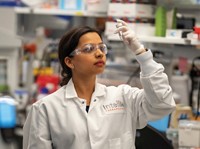Advertisement
Grab your lab coat. Let's get started
Welcome!
Welcome!
Create an account below to get 6 C&EN articles per month, receive newsletters and more - all free.
It seems this is your first time logging in online. Please enter the following information to continue.
As an ACS member you automatically get access to this site. All we need is few more details to create your reading experience.
Not you? Sign in with a different account.
Not you? Sign in with a different account.
ERROR 1
ERROR 1
ERROR 2
ERROR 2
ERROR 2
ERROR 2
ERROR 2
Password and Confirm password must match.
If you have an ACS member number, please enter it here so we can link this account to your membership. (optional)
ERROR 2
ACS values your privacy. By submitting your information, you are gaining access to C&EN and subscribing to our weekly newsletter. We use the information you provide to make your reading experience better, and we will never sell your data to third party members.
Gene Therapy
Vertex strengthens deal with Crispr Therapeutics
The revised deal gives Vertex a greater share in the biotech firm’s gene-editing technology
by Megha Satyanarayana
April 24, 2021
| A version of this story appeared in
Volume 99, Issue 15

Betting on a bigger payoff, Vertex Pharmaceuticals has increased its investment in Crispr Therapeutics, whose gene-editing therapy for the treatment of sickle cell disease and β thalassemia is in early trials.
Vertex will pay Crispr Therapeutics an additional $900 million and cover 60% of the cost of developing the DNA-snipping treatment CTX001 in exchange for 60% of the profits. The previous deal was for 50% of both costs and profits.
The revised agreement indicates Vertex’s faith in CTX001. The therapy turns on the fetal hemoglobin gene in stem cells, allowing replacement of the sickled hemoglobin in people with sickle cell disease and the lost hemoglobin in people with β thalassemia.
“Clearly, management must have high commercial hopes,” analysts from JP Morgan say in a research report.
CTX001 is applied to stem cells recovered from someone with sickle cell disease or β thalassemia. The CRISPR-Cas9 construct is guided to chromosome 2, where it cuts the DNA in a spot that allows the stem cell’s genetic machinery to start making fetal hemoglobin. The stem cells, now producing fetal hemoglobin, are returned to the person. Scientists believe that the presence of fetal hemoglobin can make up for missing hemoglobin.
In a December investor report, the two companies detailed treatment results from 10 of the 20 people who have received the treatment, saying that fetal hemoglobin levels and total hemoglobin levels were “clinically meaningful” and lasted for several months.
Vertex and Crispr Therapeutics are not the only companies with CRISPR-based therapies in the works. Bluebird Bio won approval in Europe for a β thalassemia therapy, but the firm has halted sales while it investigates two people in its sickle cell trials who developed cancer. Editas Medicine won US approval to begin a trial of EDIT-301 for sickle cell, and Intellia Therapeutics is about 18 months into its trial of NTLA-2001 for transthyretin amyloidosis.
Vertex initially invested in Crispr Therapeutics—cofounded by Nobel laureate and CRISPR codiscoverer Emmanuelle Charpentier—nearly 6 years ago.




Join the conversation
Contact the reporter
Submit a Letter to the Editor for publication
Engage with us on Twitter